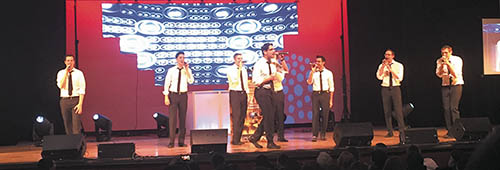
Queens College’s Colden Auditorium was filled to capacity for the second year running as local Jewish outreach organization Chazaq held its 4th Annual Big Event. Living up to its name, everything about the event was “big,” from the size of the audience (over 2,000 in attendance), to the high-profile personalities involved, to the Torah concepts invoked by the evening’s speakers.
The borough’s leadership was well represented, with New York State Assemblymen Michael Simanowitz and David Weprin, New York State Senator Toby Ann Stavisky and City Council Members Karen Koslowitz and Rory Lancman all making personal appearances. Also in attendance were representatives of Congresswoman Grace Meng, Queens Borough President Melinda Katz, and New York City Comptroller Scott Stringer. The presenters also included US Senator Chuck “Shomer Yisrael” Schumer (his second consecutive appearance); even Mayor Bill de Blasio himself stopped by!
“Chazaq is such a wonderful and extraordinary organization,” declared de Blasio, “and the impact you have made… It is so important to support Chazaq because you have touched so many lives and you’ve strengthened the community in so many ways.” The Mayor went on to extol the various social, cultural and religious programs hosted by Chazaq, and to discuss, with a sense of gratitude, the contributions of the Jewish immigrant population to the greater New York community. Even as de Blasio struggled with Hebrew phrases like “chag sameach” (“happy holiday,” in reference to the upcoming festival of Passover), one couldn’t help being charmed by the earnestness of his effort.
After the mayor’s thoughtful opening address, an invocation of sorts was offered by HaRav HaGaon Yitzchak Yisraeli, the newly appointed head rabbi and posek (religious legal authority) of New York’s Sephardic-Bukharian community. In addition to opening the proceedings with a reading of Tehillim—standard at such events—the Rav proceeded to include the recitation of Shema, the fundamental Jewish declaration of faith, and of assorted verses declaring the sovereignty of God. A sort of messianic fervor filled the room as, on the screen behind Rav Yisraeli, animations played featuring inspirational (or perhaps more accurately, aspirational) imagery of the Temple in Jerusalem. The rabbi concluded by offering words of blessing for Chazaq’s founder and director, Rabbi Ilan Meirov, as well as his brother (and Chazaq’s head of operations) Reb Yaniv Meirov—all to thunderous applause.
While local legislators and government executives shed light on the social and cultural significance of Chazaq’s diverse program offerings, and Rav Yitzchak Yisraeli endowed the event with an overarching sense of holiness, anchoring the line-up of esteemed orators were Rabbi Dr. Avraham Twerski and Charlie Harary, a prominent investor-turned-motivational speaker—well known, in other words, as both a supporter of Chazaq and a giver of chizzuq. Twerski and Harary both captivated the crowd with Passover-themed words of Torah wisdom, given in their own inimitable styles.
Rabbi Twerski, a noted psychologist and author, discussed the concept of freedom in the context of the approaching Passover holiday. He drew from his own experience helping addicts break free from their addictions to explain what it means to be “enslaved” in a spiritual sense. It is freedom of the spirit, explains Twerski, rather than political independence, that is at the core of Pesach. This, in turn, can reconcile the seemingly conflicting notions of Pesach as “The Season of Our Freedom,” and a lengthy, complicated observance preceded by weeks of preparation, often including harsh household labor.
Following the keen insights of Rabbi Dr. Twerski, radio-show host Charlie Harary analyzed the concept of “Amalek,” whose memory Jews are religiously obligated to erase…by remembering it on a designated Sabbath before Purim each year. Rather than identifying Amalek with a specific tribe, he describes this implacable enemy of the Jewish way of life as a “virus,” one that infects the mind by fostering doubt as to God’s presence or love for His people.
Amid these divrei chizuq were moving musical performances by Rabbi Avi Kilimnick and Yeshiva University’s a cappella viral video sensation, The Maccabeats. Prior to their concert (one of the main draws of the Big Event) and between speeches, group member Eytan gave a brief solo performance, including a heartfelt rendition of the song “No More,” a heartfelt tribute to Naftali Fraenkel, Gilad Shaer and Eyal Yifrah, three teenaged Israeli yeshiva students who were abducted and murdered by terrorists in 2014. After a brief address by Senator Schumer, the entire group took the stage and offered rousing renditions of popular Jewish songs, including their own holiday-themed parodies of contemporary hits. A fitting conclusion to an evening of inspiration that was one hit after another after another.
“This year’s big Chazaq event was, Baruch Hashem, a great success,” reflected operations manager Yaniv Meirov. “People were inspired and entertained. It was a big Kiddush Hashem (sanctification of the Divine name). But now we must focus on continuing our work within the community on a smaller scale.” This, Meirov explained, means “doing more for local Jewish public school students.”
“We attract and inspire many boys and girls throughout the year, some of whom we successfully put in yeshiva, and many that have sincerely changed their way of life in positive and spiritually uplifting ways. But there are so many more kids to work with. And to do that we need the community’s continuous support, as this is truly a matter of pikuach nefesh (saving lives).”
By Daniel Perez













